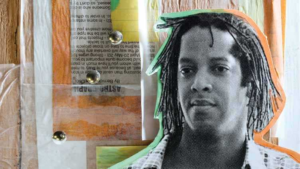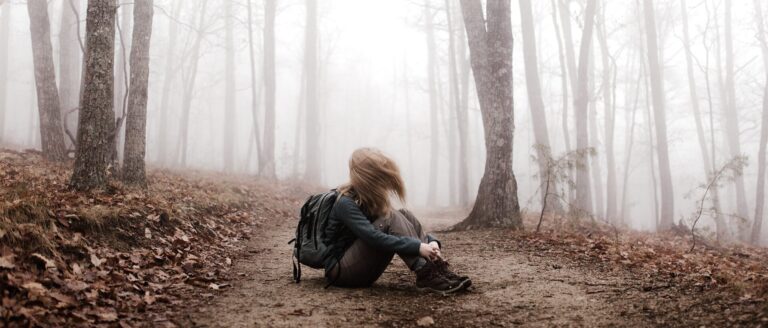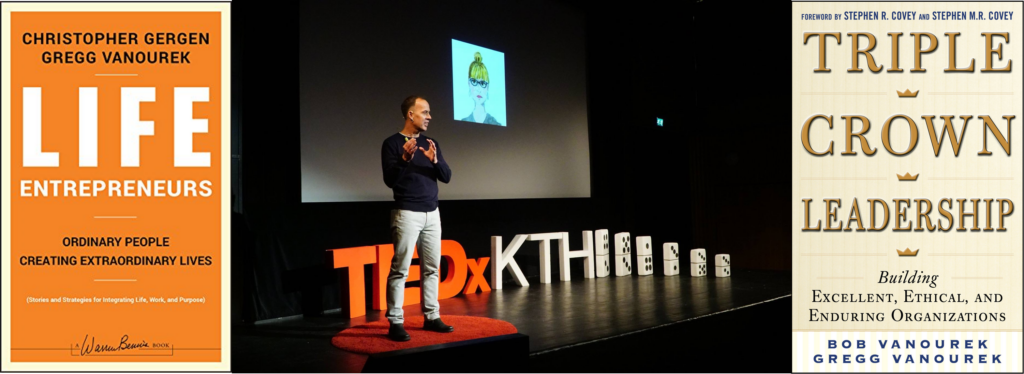These days, will all the pressures and pushes we feel, it can be easy to lose ourselves. We get consumed by events or other people’s priorities, surrendering our agency or initiative.
We can lose ourselves so much that we hardly recognize ourselves. Or let our own values, priorities, and aspirations fall by the wayside.
We can become accustomed to suppressing our needs, desires, or feelings. Or lose sight of who we really are and what we want in life. We can stop investing in our learning and growth, stop pursuing our dreams and passions, or neglect our inner life so much that it fades and withers.
Losing ourselves is a common trap these days, but imperative that we address it, because it robs our lives of meaning and joy.
When Warren Lost Himself

When Warren Brown chose the legal profession, he probably thought he had found himself—or at least his place in the world.
He had chosen law school, he says, because “I was driven by the expectation that I needed some type of profession… driven by parental expectations and by looking at my peers.”
Warren was successful in the eyes of many, and he had the opportunity to impact many through his work for a government agency.
Down the road, Warren found himself at a Tibetan Freedom Festival listening to a band. He was struck by the lyrics in the song, “Karma Police,” by Radiohead:
“For a minute there I lost myself, I lost myself.”
For Warren, these words hit deep. Out of the blue, his inner voice started interrogating him with provocative questions:
Are you there? Are you happy? Are you you?
His answers to those questions were illuminating:
Yes. No. No.
Yes, he was there—finally starting to listen again to his inner voice.
But no, he wasn’t happy.
And no, he wasn’t feeling like himself anymore.
The next question that came up was equally surprising:
Are you ready?
Ready? For what?
For Warren, the answer turned out to be baking, a lifelong passion. He realized that for the preceding year he “had been waiting for something to happen, and it never did. I was tired of waiting.”
Warren was ready. The realization that he wasn’t happy and that he had lost himself set him on a new path in which he became what we call a “life entrepreneur”—someone who intentionally and creatively designs his life by integrating his life and work with purpose and passion.

Warren pursued his passion with gusto, and it led him to all sorts of interesting and unexpected places and roles, including founder of the CakeLove bakeries and Love Café, cable TV host, cookbook creator, and more.

How We Lose Ourselves
There are several different ways we can lose ourselves. Here we note seven of the most common ways:
1. We can lose ourselves in work and busyness.
The trap here is subsuming ourselves to the needs of our organization, the demands of our manager, or the expectations of our role (and the way we can obsess over it).
In some cases, we end up worshipping our work (and all its trappings, such as wealth, status, and prestige), subsuming our lives to our work. Without enough white space in our lives, we can lose ourselves. And we can lose ourselves in work, busyness, and workaholism.
2. We can lose ourselves in addiction to success or admiration.
The desperate pursuit of success—often fueled by our fragile or wounded ego or by our desire to please demanding parents—can take us away from ourselves. As we get caught up in our desired image, or in the prestige we seek, we can drift away from our core, from who we really are and what we value.
We can get so caught up in the chase that we compromise our authenticity or values on the way to the top. And we can get so driven that we lose sight of the people we love or the things that capture our hearts. We can lose our artistry and uniqueness. Or we can become success robots, dutifully following social programming instead of pursuing our calling.
“As we become more obsessed with succeeding… we lose touch with our souls and disappear into our roles. The child with a harmless after-school secret becomes the masked and armored adult—at considerable cost to self, to others, and to the world at large.” -Parker Palmer, A Hidden Wholeness
3. We can lose ourselves in trying to please others and be liked
We all want others to like us (except for sociopaths). It’s part of our hardwiring, because there’s safety and comfort in groups, in belonging. But when taken too far, it becomes “people pleasing.”
We get stretched thin and lose track of our own needs, aspirations, and health. It’s exhausting to be in perpetual pursuit of the favorable opinions of others, especially when the reality is that most of those people are likely caught up in their own challenges and concerns.
“Don’t lose yourself trying to be everything to everyone.”
-Tony Gaskins
4. We can lose ourselves in trying to be perfect.
The perfectionism trap is a common one. When caught up in it, we’re overly critical of ourselves and preoccupied with looking good to others. We assume that flawlessness is the only route to peace, but we’re actually waging war on ourselves because that standard is impossible to reach.

Take the Traps Test
We all fall into traps in life. Sometimes we’re not even aware of it, and we can’t get out of traps we don’t know we’re in. Evaluate yourself with our Traps Test.
5. We can lose ourselves by accepting the cultural programming we received as children.
Mindlessly accepting the worldview of our parents or the paradigm of our peers can also lead to losing ourselves. It’s easy to lead our lives around notions engrained in us early on, such as:
- Life is a competition.
- Life is a zero-sum game.
- Everything in the world is winner-take-all.
- We can’t trust anyone.
- Life is struggle, and we must fight and grind constantly.
- We must keep pushing and never stop to rest.
- We’re worthless.
- We are not worthy of love and respect.
- We’re only as good as our achievements.
- We deserve the bad things that happen to us.
- Money is everything.
- Success is everything.
There may be kernels of truth in some of these notions, but we’re all different and on different paths in different times and places. We’re wise to question those ideas and develop our own worldview based on our own experience and intuition.
6. We can lose ourselves when we follow the default option in front of us.
We should ask ourselves a question before jumping into a new project or assignment:
Do we really want it?
We should be wary of the call of the conventional path, the pull of the prestige magnet, the inclination toward conformity, the trap of caring too much what others think, and the Siren call of contorting ourselves to meet the expectations of others.
For example, must passionate and gifted teachers accept a promotion to school administration because others think they’d be crazy not to? Should we all go for the next standard career advancement, regardless of its fit with who we are and what we want or its suitability for the season of life we’re in?
7. We can lose ourselves in a relationship.
We’re so afraid of loneliness—with its longing and its stigma—that we can subsume ourselves to the needs or whims of another.
When we do so, we effectively become a passenger on someone else’s ship.
When Losing Ourselves Is a Good Thing
It’s important to be clear and precise here. While losing ourselves can be a painful trap to fall into, there are certain versions of losing ourselves that are good.
When talking about the trap of losing ourselves, we’re not talking about losing ourselves in:
- a larger cause or in service to others
- our passions and the things we love
- a grand adventure
- an experience of awe
- a state of flow in which we experience complete absorption in what we’re doing and lose track of time
And we’re not talking about the normal adjustments and compromises we can and should make in a healthy relationship, with its natural give-and-take.

Crafting Your Life and Work Course
Regain clarity, direction, and motivation for your next chapter, starting with a powerful foundation of self-awareness and commitment to your values and aspirations.
Reflection Questions
- Are you losing yourself—in work and busyness, addiction to success, pleasing others, trying to be or appear perfect, accepting your cultural programming, following default options, or a relationship?
- What will you do, starting today, to bring more of yourself back into your life—to be you unapologetically?
Tools for You
- Traps Test (Common Traps of Living) to help you identify what’s getting in the way of your happiness and quality of life
- Quality of Life Assessment so you can discover your strongest areas and the areas that need work, then act accordingly.
- Crafting Your Life & Work online course to help you design your next chapter and create a life you love.
Related Traps
The trap of losing ourselves is related to several of the other common traps of living, including:
- Neglecting Our Inner Life
- Caring Too Much about What Others Think
- Comparison Trap
- Conformity Trap
- Perfectionism Trap
- Having Our Identity Wrapped Up Too Much in Our Work
- Losing Ourselves in Busyness and Overwork
- Focusing Too Much on Others’ Needs
- People-Pleasing
Postscript: Inspirations
- “…the longer I’ve lived, the more I’ve lost what’s inside me—and ended up empty.” -Haruki Murakami
- “When you lose touch with yourself, you lose yourself in the world.” -Eckhart Tolle
- “There is vitality, a life force, energy, a quickening that is translated through you into action, and because there is only one of you in all of time, this expression is unique. And if you block it, it will never exist through any other medium and it will be lost. The world will not have it. It is not your business to determine how good it is nor how valuable nor how it compares with other expressions. It is your business to keep it yours clearly and directly, to keep the channel open.” -Jonathan Fields, How to Live a Good Life
- “Once you don’t have freedom and you’re obliged to do many things you don’t want, and it becomes a routine, then your identity is at stake because you can feel that you are not anymore yourself, that you are what they want you to be—and you can lose yourself.” -Ingrid Betancourt
- “It’s great if you can help others, but seriously don’t lose yourself in the process!” -Karen Gibbs
- “Life is short, and it is sinful to waste one’s time. They say I’m active. But being active is still wasting one’s time, if in doing one loses oneself. Today is a resting time, and my heart goes off in search of itself.” -Albert Camus
- “Your true self is right there, buried under cultural conditioning, other people’s opinions, and inaccurate conclusions you drew as a kid that became your beliefs about who you are. ‘Finding yourself’ is actually returning to yourself. An unlearning, an excavation, a remembering who you were before the world got its hands on you.” -Emily McDowell

Gregg Vanourek’s Newsletter
Join our rapidly growing community. Sign up now and get monthly inspirations (new articles, opportunities, and resources). Welcome!
++++++++++++++++++++++++++++++
Gregg Vanourek is a writer, teacher, TEDx speaker, and coach on personal development & leadership. He is co-author of three books, including LIFE Entrepreneurs: Ordinary People Creating Extraordinary Lives (a manifesto for living with purpose and passion) and Triple Crown Leadership: Building Excellent, Ethical, and Enduring Organizations (a winner of the International Book Awards). Check out his Crafting Your Life & Work online course or get his monthly newsletter. If you found value in this article, please forward it to a friend. Every little bit helps!


